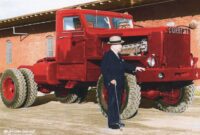Water Tanks For Pickup Trucks: Your Comprehensive Guide to Mobile Water Solutions pickup.truckstrend.com
Pickup trucks are synonymous with versatility, hauling everything from tools and equipment to camping gear and lumber. But what if your payload needs to be liquid, specifically water? Enter the unsung hero of utility vehicles: the water tank for pickup trucks. These robust containers transform your truck bed into a mobile reservoir, offering an invaluable resource wherever the road, or lack thereof, takes you. From remote agricultural operations to extended off-grid adventures, and from vital construction site support to emergency preparedness, a dedicated water tank significantly expands the capabilities of your pickup, making it an indispensable tool for a multitude of tasks.
This comprehensive guide will delve into everything you need to know about water tanks for pickup trucks, helping you understand their importance, choose the right one, install it safely, and maintain it effectively.
Water Tanks For Pickup Trucks: Your Comprehensive Guide to Mobile Water Solutions
Why You Need a Water Tank for Your Pickup
The reasons to equip your pickup with a water tank are as diverse as the truck owners themselves. Here’s a look at the primary benefits and applications:
- Off-Grid Living & Overlanding: For those embracing the freedom of remote living or extended camping trips, a reliable water supply is paramount. A truck bed water tank provides potable water for drinking, cooking, washing, and even showering, eliminating the need to constantly seek out water sources.
- Agriculture & Livestock: Farmers and ranchers often need to transport water for irrigating crops, filling livestock troughs in remote pastures, or providing water for animals during transport. A truck-mounted tank offers a flexible and efficient solution.
- Construction & Job Sites: Dust suppression, equipment washing, concrete mixing, and providing drinking water for crews are common requirements on construction sites. A mobile water tank ensures these needs are met, especially in areas without direct access to utilities.
- Emergency Preparedness: In the event of natural disasters, power outages, or water supply disruptions, having a readily available supply of fresh water can be life-saving. A pickup truck water tank ensures you can transport water to those in need or secure it for your own family.
- Mobile Services & Detailing: Businesses like mobile pressure washing, landscaping, or vehicle detailing rely on a consistent water supply. A truck tank allows them to operate anywhere, independent of external water hookups.
- Dust Control & Fire Suppression: For properties with long dirt driveways or in areas prone to wildfires, a water tank can be used for effective dust control or as a first line of defense against small fires.

Types of Water Tanks for Pickup Trucks
Water tanks for pickup trucks come in various forms, each designed to suit specific needs and truck configurations. Understanding these types is crucial for making an informed decision.
By Material:
- Polyethylene (Plastic): The most common and affordable option. Poly tanks are lightweight, durable, rust-proof, and often come in food-grade versions for potable water. They are resistant to chemicals and impacts but can degrade over time with prolonged UV exposure if not treated or covered.
- Aluminum: Lighter than steel and corrosion-resistant. Aluminum tanks are durable and can be custom-fabricated, making them a good choice for specialized applications. They are generally more expensive than plastic.
- Stainless Steel: The most robust and durable option, offering excellent corrosion resistance and strength. Stainless steel tanks are heavy and the most expensive, typically used in heavy-duty commercial or industrial applications where longevity and specific chemical compatibility are critical.
By Shape and Design:
- Rectangular/Square Tanks: The most basic and versatile shape, designed to sit flat in the truck bed. They come in a wide range of capacities and are easy to secure.
- L-Shaped (Wheel Well) Tanks: Designed to fit over or around the truck’s wheel wells, maximizing space utilization in the bed. These are popular for maintaining bed functionality alongside water storage.
- Leg Tanks: Feature molded "legs" that allow the tank to sit above the wheel wells, creating space underneath for other equipment. They are common in agricultural spraying applications.
- Portable/Stackable Tanks: Smaller, often rectangular tanks with handles, designed for easy loading/unloading and transport. Ideal for less frequent use or when water needs are lower.
- Flat Tanks (Under-Bed or Slimline): Less common for pickups due to space constraints but some custom solutions exist to fit under the bed or along the side rails, maximizing bed space.
By Capacity:
Water tanks for pickups range significantly in size, from compact units of 25-50 gallons up to large industrial tanks exceeding 200-300 gallons. Your choice will depend on your water needs, the duration of use, and your truck’s payload capacity.
Key Considerations When Choosing a Water Tank
Selecting the right water tank requires careful thought to ensure it meets your specific requirements and is compatible with your truck.
- Capacity vs. Weight: Water is heavy (approximately 8.34 lbs per gallon). A 100-gallon tank adds over 834 lbs to your truck, plus the weight of the tank itself. Always check your truck’s Gross Vehicle Weight Rating (GVWR) and payload capacity to ensure you don’t overload it. Overloading compromises safety, handling, and can damage your vehicle.
- Material Choice: Consider what you’ll be storing. For potable drinking water, a food-grade polyethylene tank is essential. For non-potable uses (e.g., dust suppression, irrigation), standard polyethylene or other materials might suffice.
- Dimensions & Fit: Measure your truck bed thoroughly, including width, length, and height clearance (especially if you have a tonneau cover or cap). Account for wheel wells when considering L-shaped or leg tanks. Ensure there’s enough room for mounting hardware and accessories.
- Mounting & Stability: How will the tank be secured? Most tanks require heavy-duty straps, chains, or bolt-down skid frames to prevent shifting during transit, especially during sudden stops or turns. A properly secured tank is critical for safety.
- Pump & Accessories: Do you need a pump? A 12V DC electric pump is common for spraying, transferring, or pressurized water delivery (e.g., for showers). Consider hoses, nozzles, filters (for potable water), level indicators, and fill/drain valves. Some tanks come with integrated pump systems.
- Drainage & Cleaning: Look for tanks with accessible drain ports for easy emptying and cleaning. Regular cleaning is vital, especially for potable water tanks, to prevent algae and bacteria growth.
- Budget: Prices vary widely based on material, capacity, and features. Factor in not just the tank cost, but also pumps, hoses, mounting hardware, and any filtration systems.
Installation and Maintenance Guide
Proper installation and regular maintenance are crucial for the longevity and safe operation of your pickup truck water tank.
Installation:
- Preparation: Clear your truck bed of any debris. If you’re installing a skid-mounted system, ensure the truck bed is clean and dry.
- Positioning: Carefully place the tank in the desired location. Distribute the weight as evenly as possible over the truck’s axles. For large tanks, positioning closer to the cab can improve handling.
- Securing: This is the most critical step.
- Straps: Use heavy-duty, rated ratchet straps. Loop them around the tank and secure them to multiple anchor points in the truck bed. Ensure they are tightened securely, checking periodically during initial drives.
- Bolting/Skid Mounts: Many larger tanks or integrated systems come with bolt-down points or are mounted on skids that can be bolted directly to the truck bed. This offers the most secure attachment. Always use appropriate hardware and reinforce the bed if necessary.
- Pump & Hose Connections: If using a pump, mount it securely, preferably near the tank’s outlet. Connect the suction hose to the tank’s outlet and the discharge hose to your desired nozzle or outlet. Ensure all connections are tight to prevent leaks.
- Power (for pumps): Connect the 12V pump to your truck’s battery, ideally through a fused connection to protect your electrical system. Consider an auxiliary battery for extended use to avoid draining your starting battery.
Maintenance:
- Regular Cleaning: For potable water tanks, clean regularly to prevent algae and bacteria. A common method is to use a mild bleach solution (1/4 cup bleach per 15 gallons of water), letting it sit for a few hours, then thoroughly rinsing several times. Non-potable tanks should also be cleaned to prevent sediment buildup.
- Draining for Winter: If you live in a freezing climate, always drain your tank completely before winter to prevent water from freezing and potentially cracking the tank or damaging the pump and plumbing.
- Inspect for Leaks: Periodically check all connections, hoses, and the tank itself for any signs of leaks or cracks. Address them immediately to prevent water loss and potential damage.
- Pump Maintenance: Follow the manufacturer’s recommendations for pump maintenance, which may include cleaning filters, checking seals, and lubricating moving parts.
- Securement Check: Regularly inspect your straps or mounting bolts to ensure they remain tight and secure. Vibrations from driving can loosen them over time.
Safety Tips:
- Weight Distribution: Always be mindful of the added weight and how it affects your truck’s handling, braking, and acceleration.
- Center of Gravity: A full tank of water raises your truck’s center of gravity, making it more prone to body roll in turns. Drive cautiously.
- Secure the Load: A shifting water tank is extremely dangerous. Double-check all securement points before driving.
Applications and Use Cases
Beyond the general benefits, here are more specific ways water tanks enhance your pickup’s utility:
- Remote Campsites: Provide pressurized water for an outdoor shower, fill up portable water containers, or wash dishes after a meal.
- Garden & Landscaping: Water newly planted trees or irrigate distant garden beds without dragging hoses.
- Livestock Management: Quickly fill water troughs in various paddocks, especially useful during rotational grazing.
- Emergency Response: Serve as a mobile water point for communities affected by infrastructure damage or for fire departments needing quick access to water in rural areas.
- Dust Control: On construction sites, gravel roads, or equestrian arenas, a water tank with a sprayer attachment effectively controls dust, improving air quality and visibility.
- Mobile Business Support: Power a pressure washer for mobile auto detailing, clean solar panels, or wash windows on large buildings.
Practical Advice and Actionable Insights
- Don’t Overload: Always know your truck’s payload capacity. It’s better to have a slightly smaller tank and be safe than to push your vehicle beyond its limits.
- Consider Multi-Purpose Use: If you only occasionally need water, an L-shaped tank might be ideal as it leaves most of your truck bed open for other cargo.
- Invest in a Good Pump: A reliable 12V pump will make filling, transferring, and using water much easier and more efficient. Look for pumps with a good flow rate (GPM – gallons per minute) and pressure (PSI).
- Plan Your Water Usage: Estimate your daily water needs for drinking, cooking, washing, etc., to determine the appropriate tank capacity. Overestimate slightly to be safe.
- Regular Checks: Before every trip, especially with a full tank, check all connections, straps, and hoses.
- Source Your Water Safely: If using for potable water, ensure your water source is safe and consider additional filtration if there’s any doubt.
Water Tank For Pickup Trucks: Estimated Price Guide
Please note that prices are highly variable based on brand, specific features, material quality, and market conditions. This table provides estimated price ranges for common types and capacities. Always shop around and compare features before purchasing.
| Tank Type / Material | Capacity Range (Gallons) | Estimated Price Range (USD) | Key Features / Notes


